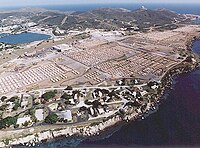
Photo from wikipedia
Most scholarly analyses of memory politics investigate how historical events are remembered selectively in order to justify political choices. Recent research has shown that ‘silencing the past’, notably the omission… Click to show full abstract
Most scholarly analyses of memory politics investigate how historical events are remembered selectively in order to justify political choices. Recent research has shown that ‘silencing the past’, notably the omission of relevant historical events, is also an important aspect of memory politics. This article examines how Italian leaders silenced significant periods of Italy’s history during the refugee and migrant crisis in 2014–2018. Drawing on memory politics and postcolonial literature, the article argues that Italian foreign policy discourses are based on both historical oblivion and the long-standing myth of the ‘good Italian’. The myth negates the controversial aspects of Italy’s colonial experience and permeates the country’s self-perception as an international actor. Italian foreign policy narratives also silenced the highly relevant precedent of Italian migration abroad. The focus is on the public speeches of Italy’s main political actors, notably national ministers and the leaders of the largest parties in parliament.
Journal Title: International Politics
Year Published: 2020
Link to full text (if available)
Share on Social Media: Sign Up to like & get
recommendations!